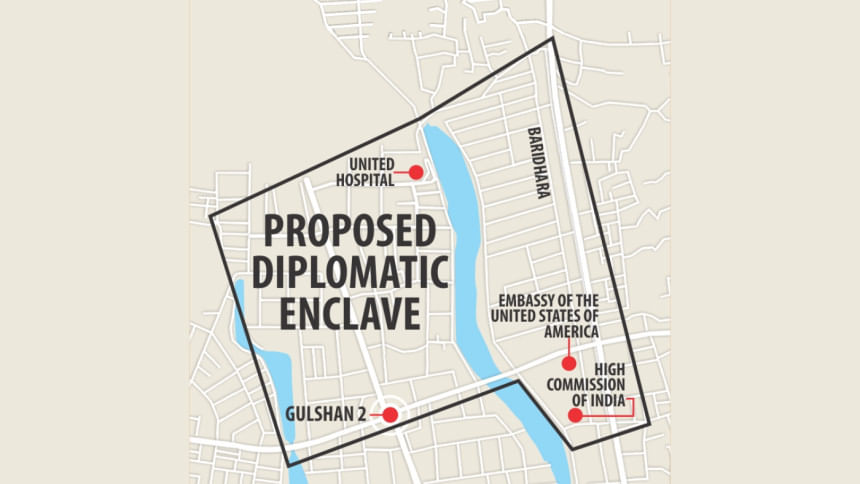Police for fencing diplomatic zone

The Dhaka Metropolitan Police has proposed that the government build a secured diplomatic enclave in Baridhara and North Gulshan areas to ensure security of diplomats.
In a letter, the DMP said it would be very difficult to ensure overall security of diplomats without building a brick wall or metal wire fence surrounding the proposed area.
The letter was sent to the mayor of Dhaka North City Corporation (DNCC), and secretaries to the ministries of home, foreign affairs and local government division on July 16, a highly-placed DMP source told The Daily Star.
Following the July 1 Holey Artisan Bakery attack, police have become more concerned about diplomats' security. The incident prompted law enforcers to increase police presence in the area, motorcycle and foot patrol, joint forces' patrol, installation of more checkpoints and activities of plainclothes police.
Law enforcers also reviewed the overall situation, especially the security situation, and felt that diplomats' security cannot be ensured by policing alone.
The DMP argues that most diplomatic offices are spread all over Gulshan. In this area, there are offices of banks, insurance companies, educational institutions, restaurants, hotels, recruiting agencies and many other establishments. A large number of people visit these offices every day.
It observes that it is not possible to keep track of the activities of these people through police checkpoints or patrols. So, police fear that terrorists can easily dodge law enforcers to carry out further attacks. That is why the diplomatic zone should be urgently separated by installing specific fences.
As per the proposal, this enclave would cover two sides of Gulshan 2 crossing to United Hospital and the areas around the US embassy and the Indian High Commission.
For this, it proposed closure of the following roads: Gulshan-Kalachandpur connecting road (behind United Hospital), Gulshan-Banani connecting road crossing (62/63), and roads no 50, 51, 53, 91 and 92 in Gulshan.
“As all of these roads have alternatives, police believe that closing these roads would not cause a problem to the Gulshan residents,” the letter says.
Police also argued that a large number of youths enter the area everyday to go to commercial places and educational institutions, hotels and restaurants there. A large part of them have good reasons to carry backpacks. Police believe that terrorists can melt in the crowd to carry out any terrorist activities.
Besides, residents employ up to five people like drivers and domestic helps. Terrorists can pretend to be these service people to launch attacks.
“It would be impossible to check such a large number of people on a daily basis. That's why, in the interest of the nation and to ensure security of diplomats, the diplomatic enclave must be secured,” police said.
GULSHAN SOCIETY TO COOPERATE
Omar Sadat, secretary general of Gulshan Society, said they were working in cooperation with the DMP and the DNCC for the sake of security, as it is a huge national concern. He said they would also ensure that the citizens' amenities are not affected.
Asked if closure of the above-mentioned roads would create traffic congestion, he said those roads are temporarily closed, but would eventually be opened and gates would be set up.
The DNCC has already agreed in principle to set up gates at nine entry points to Gulshan and four entry points to Banani to strictly monitor the movement of people and vehicles.
The Gulshan Society will provide stickers to the vehicles regularly plying the area so that it can easily identify those vehicles. Those having no stickers can also enter the area, but will have to go through thorough checks, he said.
There will also be 10 AC buses dedicated for the diplomatic zone, Omar Sadat said, adding that all passengers will be checked before they board the buses. The authorities will fix the rickshaws that will operate in the area. The background of the rickshaw pullers and the owners will also be scrutinised.
“We are working closely with the DNCC and DMP. We won't do anything that will curtail citizens' amenities,” Omar Sadat said.
RESIDENTS' MIXED REACTION
A resident of Road-90, Gulshan Avenue, expressed frustration about traffic movement when she was told about the DMP decision.
“My office is in Dhanmondi. To reach there before 8:30am, I have to start at 7:15am. If some alternative roads are closed down, then I'll have to start at 6:30am,” she said.
“They [the authorities] need to plan about controlling the traffic before making such decisions,” she added.
A Gulshan North Avenue resident, who lives near the United Hospital, however, welcomed the DMP's decision to close down the road leading to Kalachandpur.
“Initially, it was a narrow alley where only rickshaws plied. But now even trucks pass through the road, creating congestion for those of us who live on Road 70 and 71 in Gulshan North,” he said.
He added that residents of his neighbourhood felt quite relieved when the Kalachandpur connecting road was temporarily closed following the Holey Artisan attack.
He, however, said such a decision might create difficulties in commuting for many. “The authorities should take time and conduct feasibility studies before closing down any road permanently.”
A resident of Road-69 Gulshan North Avenue said diplomatic zones are protected in most of the countries in the world. “In other countries, they are built in a separate part of the city.”
“I personally think that a system should be developed to protect this diplomatic zone, but then too much protection might hamper freedom of movement of the people,” he added.
All three spoke to The Daily Star on condition of anonymity.

 For all latest news, follow The Daily Star's Google News channel.
For all latest news, follow The Daily Star's Google News channel. 



Comments